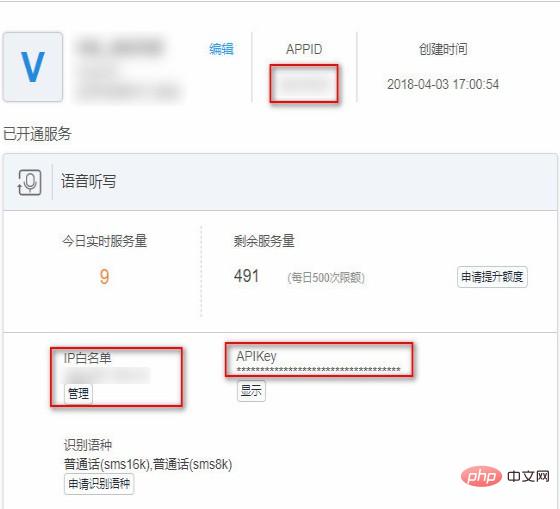Heim >Backend-Entwicklung >PHP-Problem >So implementieren Sie die PHP-Voice-to-Account-API-Schnittstelle
So implementieren Sie die PHP-Voice-to-Account-API-Schnittstelle
- angryTomOriginal
- 2019-10-26 15:51:052759Durchsuche

So implementieren Sie die PHP-Voice-to-Account-API-Schnittstelle
1. Vorbereitung
Bewerben Sie sich für ein iFlytek-Konto http://www.xfyun.cn/

IP-Whitelist hinzufügen (wirksam in 5-10 Minuten) Bereiten Sie eine Audiodatei (WAV- oder PCM-Format) vor, um APPID zu erhalten und APPKEY (APPKEY ist für jeden Dienst unterschiedlich)
const APP_ID = ‘xxxx’; const APP_KEY_IAT = ‘xxxx’; //语音听写APPKEY const APP_KEY_ISE = ‘xxxx’; //语音评测APPKEY const APP_KEY_TTS = ‘xxxx’; //语音合成APPKEY
Sprachdiktat
public function voiceIat($file_path)
{
$param = [
‘engine_type’ => ‘sms16k’,
‘aue’ => ‘raw’
];
$cur_time = (string)time();
$x_param = base64_encode(json_encode($param));
$header_data = [
‘X-Appid:’.self::APP_ID,
‘X-CurTime:’.$cur_time,
‘X-Param:’.$x_param,
‘X-CheckSum:’.md5(self::APP_KEY_IAT.$cur_time.$x_param),
‘Content-Type:application/x-www-form-urlencoded; charset=utf-8’
];
//Body
$file_path = $file_path;
$file_content = file_get_contents($file_path);
$body_data = ‘audio=’.urlencode(base64_encode($file_content));
//Request
$url = “http://api.xfyun.cn/v1/service/v1/iat”;
$ch = curl_init();
curl_setopt($ch, CURLOPT_URL, $url);
curl_setopt($ch, CURLOPT_HEADER, 0);
curl_setopt($ch, CURLOPT_RETURNTRANSFER, TRUE);
curl_setopt($ch, CURLOPT_POST, TRUE);
curl_setopt($ch, CURLOPT_HTTPHEADER, $header_data);
curl_setopt($ch, CURLOPT_POSTFIELDS, $body_data);
$result = curl_exec($ch);
curl_close($ch);
return $result;
}Sprachdiktat-Beispiel:
voiceIat('a.wav');
Sprachüberprüfung
public function voiceIse($file_path, $content)
{
$param = [
‘language’ => ‘cn’,
‘aue’ => ‘raw’,
‘category’ => ‘read_sentence’
];
$cur_time = (string)time();
$x_param = base64_encode(json_encode($param));
$header_data = [
‘X-Appid:’.self::APP_ID,
‘X-CurTime:’.$cur_time,
‘X-Param:’.$x_param,
‘X-CheckSum:’.md5(self::APP_KEY_ISE.$cur_time.$x_param),
‘Content-Type:application/x-www-form-urlencoded; charset=utf-8’
];
//Body
$file_path = $file_path;
$file_content = file_get_contents($file_path);
$body_data = ‘audio=’.urlencode(base64_encode($file_content)).’&text=’.urlencode($content);
$url = “http://api.xfyun.cn/v1/service/v1/ise”;
$ch = curl_init();
curl_setopt($ch, CURLOPT_URL, $url);
curl_setopt($ch, CURLOPT_HEADER, 0);
curl_setopt($ch, CURLOPT_RETURNTRANSFER, TRUE);
curl_setopt($ch, CURLOPT_POST, TRUE);
curl_setopt($ch, CURLOPT_HTTPHEADER, $header_data);
curl_setopt($ch, CURLOPT_POSTFIELDS, $body_data);
$result = curl_exec($ch);
curl_close($ch);
return $result;
}Beispiel für Sprachbewertung:
echo voiceIse(‘a.wav’, ‘科大讯飞真给力’);
Sprachsynthese:
public function voiceTts($content, $output_path)
{
$param = [
‘engine_type’ => ‘intp65’,
‘auf’ => ‘audio/L16;rate=16000’,
‘aue’ => ‘raw’,
‘voice_name’ => ‘xiaoyan’,
‘speed’ => ‘0’
];
$cur_time = (string)time();
$x_param = base64_encode(json_encode($param));
$header_data = [
‘X-Appid:’.self::APP_ID,
‘X-CurTime:’.$cur_time,
‘X-Param:’.$x_param,
‘X-CheckSum:’.md5(self::APP_KEY_TTS.$cur_time.$x_param),
‘Content-Type:application/x-www-form-urlencoded; charset=utf-8’
];
//Body
$body_data = ‘text=’.urlencode($content);
//Request
$url = “http://api.xfyun.cn/v1/service/v1/tts”;
$ch = curl_init();
curl_setopt($ch, CURLOPT_URL, $url);
curl_setopt($ch, CURLOPT_HEADER, TRUE);
curl_setopt($ch, CURLOPT_RETURNTRANSFER, TRUE);
curl_setopt($ch, CURLOPT_POST, TRUE);
curl_setopt($ch, CURLOPT_HTTPHEADER, $header_data);
curl_setopt($ch, CURLOPT_POSTFIELDS, $body_data);
$result = curl_exec($ch);
$res_header_size = curl_getinfo($ch, CURLINFO_HEADER_SIZE);
$res_header = substr($result, 0, $res_header_size);
curl_close($ch);
if(stripos($res_header, ‘Content-Type: audio/mpeg’) === FALSE){ //合成错误
return substr($result, $res_header_size);
}else{
file_put_contents($output_path, substr($result, $res_header_size));
return ‘语音合成成功,请查看文件!’;
}
}Beispiel für Sprachsynthese:
echo voiceTts(‘科大讯飞真给力’, ‘a.wav’);
Für weitere PHP-bezogene Kenntnisse , besuchen Sie bitte die PHP-Chinese-Website!
Das obige ist der detaillierte Inhalt vonSo implementieren Sie die PHP-Voice-to-Account-API-Schnittstelle. Für weitere Informationen folgen Sie bitte anderen verwandten Artikeln auf der PHP chinesischen Website!

